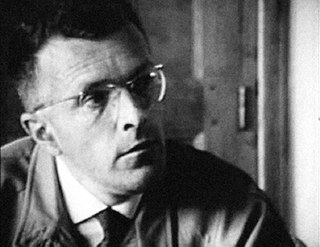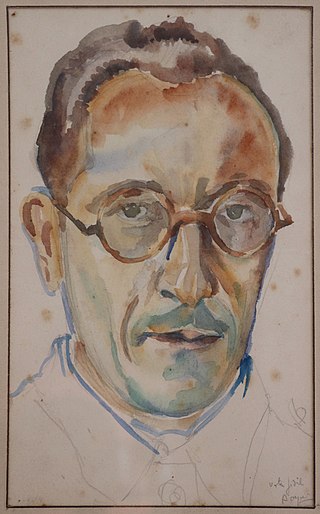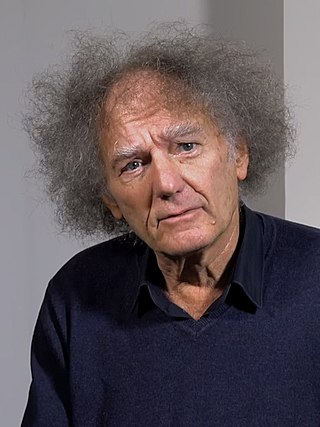Anne Sauvagnargues (born 16 March 1961) is a French philosopher specializing in the work of Gilles Deleuze.
A former student of the École Normale Supérieure in Fontenay-aux-Roses, she taught at the École normale supérieure of Lyon and has been professor at the University Paris X since 2010, [1]
She co-heads with Fabienne Brugère the series "Art Line" for the University Press of France.

Pierre-Félix Guattari was a French psychoanalyst, political philosopher, semiotician, social activist, and screenwriter. He co-founded schizoanalysis with Gilles Deleuze, and ecosophy with Arne Næss, and is best known for his literary and philosophical collaborations with Deleuze, most notably Anti-Oedipus (1972) and A Thousand Plateaus (1980), the two volumes of their theoretical work Capitalism and Schizophrenia.

Michel Serres was a French philosopher, theorist and writer. His works explore themes of science, time and death, and later incorporated prose.
Wladimir Troubetzkoy was a French literary historian of Polish-Belarusian-Russian origin.

Gilbert Simondon was a French philosopher best known for his theory of individuation and his work on the field of philosophy of technology. Simondon's work is characterized by his philosophical approach on information theory, communication studies, technology and the natural sciences. Although largely overlooked in his lifetime, the advent of the information age has collaborated to a reappraisal and increased interest in Simondon's books, with him being seen as someone who has precisely predicted and described the social effects and paradigms technical objects and technology itself have offered in the 21st century.

François Laruelle is a French philosopher, formerly of the Collège international de philosophie and the University of Paris X: Nanterre. Laruelle has been publishing since the early 1970s and now has around twenty book-length titles to his name. Alumnus of the École normale supérieure, Laruelle is notable for developing a science of philosophy that he calls non-philosophy. He currently directs an international organisation dedicated to furthering the cause of non-philosophy, the Organisation Non-Philosophique Internationale.
Pierre Grimal was a French historian, classicist and Latinist. Fascinated by the Greek and Roman civilizations, he did much to promote the cultural inheritance of the classical world, both among specialists and the general public.

Jules Vuillemin was a French philosopher, Professor of Philosophy of Knowledge at the prestigious Collège de France, in Paris, from 1962 to 1990, succeeding Maurice Merleau-Ponty, and Professor emeritus from 1991 to 2001. He was an Invited Professor at the Institute for Advanced Study, in Princeton, New Jersey (1968).

Raymond Ruyer was a French philosopher in the late 20th century. His work covered topics including the philosophy of biology, the philosophy of informatics, the philosophy of value and others. His most popular book is The Gnosis of Princeton in which he presents his own philosophical views under the pretence that he was representing the views of an imaginary group of American scientists. He developed an account of panpsychism which was a major influence on philosophers such as Adolf Portmann, Gilbert Simondon, Gilles Deleuze and Félix Guattari.
Catherine Malabou is a French philosopher. She is a Professor at the Centre for Research in Modern European Philosophy (CRMEP) at Kingston University, at the European Graduate School, and in the department of Comparative Literature at the University of California, Irvine, a position formerly held by Jacques Derrida.
Étienne Souriau was a French philosopher, best known for his work in aesthetics.
Yves Michaud is a French philosopher. As a student, he studied philosophy and science at École Normale Supérieure and the Sorbonne in Paris. His early research involved the study of political violence and empiricism, especially the works of John Locke and David Hume. He was Director of the École nationale supérieure des Beaux-Arts from 1989 to 1997. In 2000, Michaud partnered with Jean-Jacques Aillagon to establish the Université de tous les savoirs , a French government initiative to disseminate information on new scientific advances.

Luis de Miranda is a philosopher and novelist. His earlier books, written in French, have been translated into English, Chinese, Swedish, among other languages. A PhD from the University of Edinburgh, he previously graduated in philosophy at Pantheon-Sorbonne University and in economics at HEC Paris. Since 2018, Luis de Miranda is a philosophical practitioner and member of the Swedish Society for Philosophical Practice, and an academic researcher in Sweden.

Monique Canto-Sperber is a French philosopher. Her works, translated in several languages, are focused on ethics and contemporary political issues. A former Director of the École normale supérieure from 2005 to 2012, she has been President of Paris Sciences et Lettres – Quartier latin, a French higher education and research institution, since 2012.
Jean-Charles Darmon is a French literary critic born in 1961.

François Dosse is a French historian and philosopher who specializes in intellectual history.
François Zourabichvili was a French philosopher who specialized in the works of Gilles Deleuze and Baruch Spinoza.
Marcel Boll was a French scientist, sociologist, philosopher, educator, scientific journalist, and a founding member (1930) of the Rationalist Union. Boll was one of the most prolific contributors of articles to Les Cahiers Rationalistes and Raison Présente, two journals published by the Rationalist Union. He was one of the main popularizers of the theory of relativity, the quantum theory, and other aspects of the physical sciences during the interwar period (1918-1939) and in the early 1950s. An advocate of neopositivism, his numerous works on physics, philosophy, sociology, education, and other subjects all reflect his neopositivist perspective. He was the first person to draw the French public's attention to the Vienna Circle. Louis Rougier (1889-1982) and Général Charles-Ernest Vouillemin (1865-1954) later joined Boll in being among the first to introduce and promote the Vienna Circle and its overall philosophical outlook in France.

Michel Zink is a French writer, medievalist, philologist, and professor of French literature, particularly that of the Middle Ages. He is the Permanent Secretary of the Académie des Inscriptions et Belles-Lettres, a title he has held since 2011, and was elected to the Académie française in 2017. In addition to his academic work, he has also written historical crime novels, one of which continues the story of Arsène Lupin.
Claude Imbert is a French philosopher, logician, and translator of Gottlob Frege.

Fabienne Brugère is a French philosopher specializing in aesthetics and philosophy of art, history of modern philosophy, moral and political philosophy, Anglo-American philosophy studies and feminist theory. She was a professor at the Bordeaux Montaigne University and vice-president for international relations at this university. She joined the Paris 8 University Vincennes-Saint-Denis since September 2014, as chair of "philosophy of modern and contemporary arts". She has been president of the Paris Lumières University Group since November 2019, after having chaired the academic council of this institution.